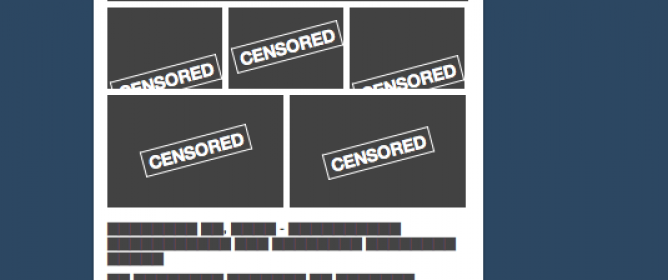Today the US House Judiciary Committee will conduct a hearing on the Stop Online Piracy Act (SOPA), a modified version of the Senate’s Protect IP Act (PDF), or PIPA, which would allow government or corporate bodies to report and subsequently block foreign sites for copyright/intellectual property infringing links. The bills would allow the US Attorney General to create a blacklist of sites to be censored by ISPs, search engines, payment networks, and advertisers. SOPA, the House bill, goes one step further and says that any site that hosts or has hosted content that infringes upon copyright, whether knowingly or unknowingly, is subject to lawsuit from private companies or the government.
Section 102 of SOPA “allows the government to impose new obligations on a range of intermediaries to block access to sites that facilitate criminal copyright or trademark infringement.” Once an order has been issued against a site or service provider, a host of intermediaries must take specific action within five days of the order. ISPs must move to prevent access to the site or portions of the site, including preventing DNS resolution of the site’s domain name; search engines must prevent the site from populating search results; payment networks must prevent or suspend transactions between the site and US customers; and, lastly, advertising networks must take action to stop serving ads on and for the site. Section 103 of SOPA creates a “notice-and-cutoff system” that would allow private parties, namely rightsholders, to target a site’s financial resources, effectively choking off the targeted site’s functional wherewithal. In essence, SOPA would make websites wholly responsible for every bit of content which passes through their pipes.

While both bills are targeted at “rogue” websites that allow indiscriminate piracy, nominally from sites beyond US borders, domestic opposition claims that the bill’s vague language and broad sweep would fundamentally change the way the Internet as we know it operates. In a letter addressed to Judiciary Committee Chairman Leahy, Ranking Member Grassly, Chairman Smith, and Ranking Member Conyers, some of the America’s leading tech companies wrote that “the bills as written would seriously undermine the effective mechanism Congress enacted in the Digital Millennium Copyright Act (DMCA) to provide a safe harbor for Internet companies that act in good faith to remove infringing content from their sites.” Experts fear that once the DMCA safe harbor provision has been removed, there is little stopping a well-funded rightsholder from targeting a wide variety of websites and platforms, especially smaller startups. Furthermore, the DNS-filtering requirement could fundamentally affect the Internet’s infrastructure, potentially reducing cybersecurity and user privacy in favor of blocking the domain name of accused sites.
Where do libraries fit in? In a November 8, 2011 letter addressed to Chairman Smith and Ranking Member Conyers, the Library Copyright Alliance (LCA), which consists of the ALA, the Association of College & Research Libraries, and the Association of Research Libraries, publicly voiced its deep concern about SOPA, particularly regarding those parts under Title II, “Additional Enhancements to Combat Intellectual Property Theft.” The letter discussed two provisions of section 201—the definition of willfulness in section 201(c) and the expansion of criminal penalties to public performances in section 201(a)mdash;as being of primary concern for libraries. Section 201 (c) suggests that the term “willful” could be expanded to incorporate a larger body of activity considered criminal copyright infringement. The LCA writes:
…willful infringement is subject to criminal sanctions. This is where section 201(c) of SOPA comes into play. Section 201(c) provides that a person “acting with a good faith reasonable basis in law to believe that that the person’s conduct is lawful shall not be considered to have acted willfully” for criminal copyright purposes. This rule of construction creates a negative implication that a person is a willful infringer if the person did not have a good faith reasonable basis in law for believing that his conduct was lawful. Thus, if a court finds that the person’s belief was unreasonable, the court might consider him a willful infringer, even if the person in good faith believed his actions were legal. Under current law, however, this level of intent constitutes ordinary infringement, not willful infringement. In other words, the rule of construction could have the effect of collapsing the three levels of intent into two: willful infringement and innocent infringement.
The LCA letter also addresses SOPA’s proposed extension and broadening of criminal sanctions for public performances, including streaming:
Under current law, infringing public performances are subject to lower criminal penalties than infringing reproductions or distributions. A willful infringer of the public performance right can only be subject to misdemeanor (as opposed to felony) sanctions, and only if the infringement was for purposes of commercial advantage or private financial gain…But, SOPA also imposes criminal penalties for public performances by means of digital networks with a retail value of more than $1,000. See proposed section 506(a)(1)(B). Felony penalties would be available if the retail value is more than $2,500. See section 201(b)(2). Thus, section 201 of SOPA for the first time authorizes both misdemeanor and felony penalties for non-commercial public performances.
At the crux of the LCA’s letter is their belief that SOPA, in addition to some recent legal action, reflects a very real and growing tension between libraries and rightsholders. The fear is that in a post-SOPA world libraries could face criminal prosecution for copyright infringement. Moreover, widening the scope of the term “willful infringement” would change libraries’ claims to fair use or any other of the Copyright Act’s privileges. The LCA also points out that licenses, presumably subject to new demands of interoperation, may not offer total security. If a prosector believes that a library has unreasonably interpreted the details of a license, then the “existence of the license will not protect the library form that claim that it acted willfully.” That risk is only exacerbated with streaming.
What do you think SOPA and PIPA could mean for libraries? Weigh in below.
